 W
WThis is a list of wars and conflicts involving the Republic of India and its predecessor states that were fought on the historic Indian subcontinent.
 W
WThe Anglo-Iraqi War was a British-led Allied military campaign during the Second World War against the Kingdom of Iraq under Rashid Ali, who had seized power in the 1941 Iraqi coup d'état, with assistance from Germany and Italy. The campaign resulted in the downfall of Ali's government, the re-occupation of Iraq by the British, and the return to power of the Regent of Iraq, Prince 'Abd al-Ilah, a British ally.
 W
WThe First Anglo-Maratha War (1775–1782) was the first of three Anglo-Maratha Wars fought between the British East India Company and Maratha Empire in India. The war began with the Treaty of Surat and ended with the Treaty of Salbai. This conflict spread between Surat and Pune saw British defeat and restoration of positions of both the parties before the war. Warren Hastings, viceroy for India (Bengal) decided not to attack Pune directly.
 W
WThe Battle of Tiruvannamalai is one of the two successful battles fought by the Madras Army in the Carnatic along with the Battle of Chengam. It was fought on 25 September 1767 between the allied forces led by the East India Company and troops of Hyder Ali. The allied forces of the English army were led by Colonel Smith.
 W
WThe First Anglo–Mysore War (1766–1769) was a conflict in India between the Sultanate of Mysore and the East India Company. The war was instigated in part by the machinations of Asaf Jah II, the Nizam of Hyderabad, who sought to divert the company's resources from attempts to gain control of the Northern Circars.
 W
WThe Second Anglo–Mysore War was a conflict between the Kingdom of Mysore and the British East India Company from 1780 to 1784. At the time, Mysore was a key French ally in India, and the conflict between Britain against the French and Dutch in the American Revolutionary War sparked Anglo–Mysorean hostilities in India. The great majority of soldiers on the company side were raised, trained, paid and commanded by the company, not the British government. However, the company's operations were bolstered by Crown troops sent from Britain, and by troops sent from Hanover, which was also ruled by Britain's King George III.
 W
WThe Fourth Anglo–Mysore War was a conflict in South India between the Kingdom of Mysore against the British East India Company and the Hyderabad Deccan in 1798–99.
 W
WThe Anglo-Persian War or Anglo-Iranian War lasted between November 1, 1856 and April 4, 1857 and was fought between the British Empire and Iran, which was ruled by the Qajar dynasty. The war had the British oppose an attempt by Iran to press its claim on the city of Herat. Though Herat had been part of Iran under the Qajar dynasty when the war broke out, it had declared itself independent under its own rebellious emir and placed itself under the protection of the British in India and in alliance with the Emirate of Kabul, the predecessor of the modern state of Afghanistan. The British campaign was successfully conducted under the leadership of Major General Sir James Outram in two theatres: on the southern coast of Iran near Bushehr and in southern Mesopotamia.
 W
WThe Barrackpore mutiny was a rising of native Indian sepoys against their British officers in Barrackpore in November 1824. The incident occurred when the British East India Company was fighting the First Anglo-Burmese War (1824–1826) under the leadership of the Governor-General of Bengal, William Amherst, 1st Earl Amherst.
 W
WThe Bazar Valley campaign of 1908 was a punitive expedition against the Zakka Khel clan of the Afridi, a Pakhtun tribe inhabiting the mountains on the Peshawar border of the North West Frontier province of British India.
 W
WThe Duar War was a war fought between British India and Bhutan in 1864–1865.
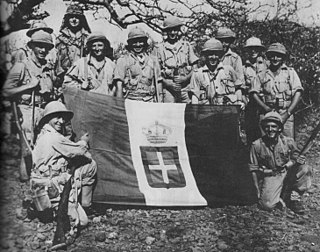 W
WThe East African campaign was fought in East Africa during the Second World War by Allies of World War II, mainly from the British Empire, against Italy and its colony of Italian East Africa, between June 1940 and November 1941. The British Middle East Command with troops from the United Kingdom, South Africa, British India, Uganda Protectorate, Kenya, Somaliland, West Africa, Northern and Southern Rhodesia, Sudan and Nyasaland participated in the campaign. These were joined by the Allied Force Publique of Belgian Congo, Imperial Ethiopian Arbegnoch and a small unit of Free French.
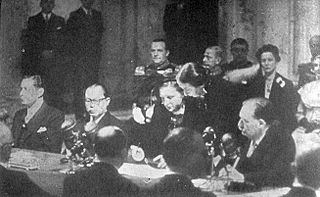 W
WThe Indonesian National Revolution, or the Indonesian War of Independence, was an armed conflict and diplomatic struggle between the Republic of Indonesia and the Dutch Empire and an internal social revolution during postwar and postcolonial Indonesia. It took place between Indonesia's declaration of independence in 1945 and the Netherlands' recognition of Indonesia's independence at the end of 1949.
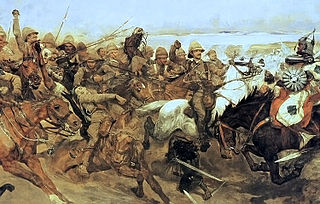 W
WThe Mahdist War was a war between the Mahdist Sudanese of the religious leader Muhammad Ahmad bin Abd Allah, who had proclaimed himself the "Mahdi" of Islam, and the forces of the Khedivate of Egypt, initially, and later the forces of Britain. Eighteen years of war resulted in the nominally joint-rule state of the Anglo-Egyptian Sudan (1899–1956), a de jure condominium of the British Empire and the Kingdom of Egypt in which Britain had de facto control over the Sudan. The Sudanese launched several unsuccessful invasions of their neighbours, expanding the scale of the conflict to include not only Britain and Egypt but the Italian Empire, the Congo Free State and the Ethiopian Empire.
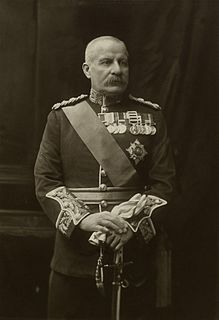 W
WThe Mahsud Waziri blockade was a British campaign against the Mahsud in the British Raj. It began with a passive blockade on 1 December 1900. The British forces were commanded by Major General Charles Egerton. The "most intense" period of fighting began on 23 November 1901. Mobile columns concentrated at Datta Khel, Jandola, Sarwakai and Wana raided Mahsud territory every several weeks, seizing lifestock, taking Mahsud members captive and inflicting heavy casualties. The Mahsud finally surrendered on 10 March 1902.
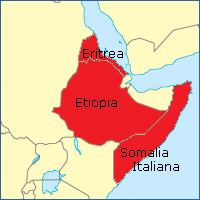 W
WOperations on the Northern front, East Africa, 1940 in the Second World War, were conducted by the British in Sudan and the Armed Forces Command of Italian East Africa in Eritrea and Ethiopia. On 1 June 1940, Amedeo, Duke of Aosta the Viceroy and Governor-General of the Africa Orientale Italiana, commander in chief of the Armed Forces Command of the Royal Italian Army and General of the Air Force, had about 290,476 local and metropolitan troops and by 1 August, mobilisation had increased the number to 371,053 troops. General Archibald Wavell, General Officer Commanding-in-Chief (GOC-in-C) of Middle East Command, had about 86,000 troops at his disposal for Libya, Iraq, Syria, Iran and East Africa. About 36,000 troops were in Egypt and 27,500 men were training in Palestine.
 W
WIn 1917, the British empire launched a successful punitive expedition against the Mahsud.
 W
WOperations against the Marri and Khetran tribes was the British name for a punitive expedition carried out against the Marri and Khetran tribes of Balochistan, British India between February and April 1918. The Marri rose against the British authorities around 18 February, encouraged by rumours that the British were short of manpower due to the First World War. British attempts at conciliation were repulsed and, on 20 February, a major attack was made by 1,000 – 3,000 Marri upon the British post at Gumbaz. This attack was repulsed by a much smaller British force that inflicted heavy losses upon the Marri. A subsequent withdrawal of British forces from Kohlu and its occupation by the Marri led the Khetrans to join the rising. The town of Barkhan was occupied by Marri-Khetran forces and raids were made upon villages in the Sibi and Loralai districts; railways in the area were also attacked.
 W
WThe Sikkim expedition was an 1888 British military expedition to expel Tibetan forces from Sikkim in present-day northeast India. The roots of the conflict lay in British-Tibetan competition for sovereignty over Sikkim.
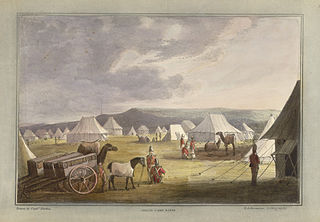 W
WThe Third Anglo-Maratha War (1817–1819) was the final and decisive conflict between the British East India Company (EIC) and the Maratha Empire in India. The war left the Company in control of most of India. It began with an invasion of Maratha territory by British East India Company troops, and although the British were outnumbered, the Maratha army was decimated. The troops were led by Governor General Hastings, supported by a force under General Thomas Hislop. Operations began against the Pindaris, a band of Muslim mercenaries and Marathas from central India.
 W
WThe British expedition to Tibet, also known as the British invasion of Tibet or the Younghusband expedition to Tibet began in December 1903 and lasted until September 1904. The expedition was effectively a temporary invasion by British Indian forces under the auspices of the Tibet Frontier Commission, whose purported mission was to establish diplomatic relations and resolve the dispute over the border between Tibet and Sikkim. In the nineteenth century, the British had conquered Burma and Sikkim, with the whole southern flank of Tibet coming under the control of the British Raj. Tibet, ruled by the Dalai Lama under the Ganden Phodrang government, was the only Himalayan state under Chinese rule instead of subjected to British influence.
 W
WThe Tirah campaign, often referred to in contemporary British accounts as the Tirah expedition, was an Indian frontier campaign from September 1897 to April 1898. Tirah is a mountainous tract of country in what was formally known as Federally Administered Tribal Areas of Pakistan, now Khyber Pakhtunkhwa province.
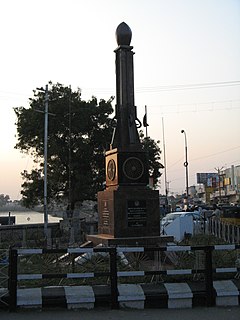 W
WThe Vellore mutiny or Vellore Revolution on 10 July 1806 was the first instance of a large-scale and violent mutiny by Indian sepoys against the East India Company, predating the Indian Rebellion of 1857 by half a century. The revolt, which took place in the South Indian city of Vellore, lasted one full day, during which mutineers seized the Vellore Fort and killed or wounded 200 British troops. The mutiny was subdued by cavalry and artillery from Arcot. Total deaths amongst the mutineers were approximately 350; with summary executions of about 100 during the suppression of the outbreak, followed by the formal court-martial of smaller numbers.
 W
WThe War in Vietnam, codenamed Operation Masterdom by the British, and also known as the Southern Resistance War by the Vietnamese, was a post–World War II armed conflict involving a largely British-Indian and French task force and Japanese troops from the Southern Expeditionary Army Group, versus the Vietnamese communist movement, the Viet Minh, for control of the southern half of the country, after the unconditional Japanese surrender.
 W
WArthur Wellesley, 1st Duke of Wellington,, was one of the leading British military and political figures of the 19th century. Often referred to solely as "The Duke of Wellington", he led a successful military career in the Indian subcontinent during the Fourth Anglo-Mysore War (1798–99) and the Second Anglo-Maratha War (1803–1805), and in Europe during the Napoleonic Wars (1803–1815).
 W
WWorld War I or the First World War, often abbreviated as WWI or WW1, was a global war originating in Europe that lasted from 28 July 1914 to 11 November 1918. Contemporaneously known as the Great War, the World War, and "the war to end all wars", it led to the mobilisation of more than 70 million military personnel, including 60 million Europeans, making it one of the largest wars in history, and also one of the deadliest conflicts in history, with an estimated 8.5 million combatant deaths and 13 million civilian deaths as a direct result of the war. Resulting genocides and the related 1918 Spanish flu pandemic caused another 17–100 million deaths worldwide, including an estimated 2.64 million Spanish flu deaths in Europe and as many as 675,000 in the United States.
 W
WThe Indian Army during World War I contributed a large number of divisions and independent brigades to the European, Mediterranean, Middle East and African theatres of war in World War I. Over one million Indian troops served overseas, of whom 62,000 died and another 67,000 were wounded. In total at least 74,187 Indian soldiers died during the war.
 W
WDuring the Second World War (1939–1945), India was controlled by the United Kingdom, with the British holding territories in India that included over six hundred autonomous Princely States. British India officially declared war on Nazi Germany in September 1939. The British Raj, as part of the Allied Nations, sent over two and a half million soldiers to fight under British command against the Axis powers. India also provided the base for American operations in support of China in the China Burma India Theater.
 W
WWorld War II or the Second World War, often abbreviated as WWII or WW2, was a global war that lasted from 1939 to 1945. It involved the vast majority of the world's countries—including all of the great powers—forming two opposing military alliances: the Allies and the Axis powers. In a total war directly involving more than 100 million personnel from more than 30 countries, the major participants threw their entire economic, industrial, and scientific capabilities behind the war effort, blurring the distinction between civilian and military resources. Aircraft played a major role in the conflict, enabling the strategic bombing of population centres and the only two uses of nuclear weapons in war to this day. World War II was by far the deadliest conflict in human history, and resulted in 70 to 85 million fatalities, a majority being civilians. Tens of millions of people died due to genocides, starvation, massacres, and disease. In the wake of the Axis defeat, Germany and Japan were occupied, and war crimes tribunals were conducted against German and Japanese leaders.